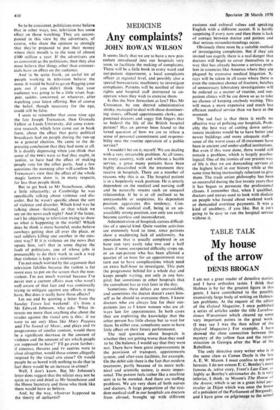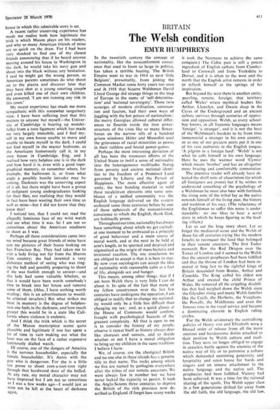TABLE TALK
My house of the arrow
DENIS BROGAN
I am not a great reader of detective stories. and I have orthodox tastes. I think that Holmes is by far the greatest figure in this genre. I have contributed to the possibly excessively large body of writing on Holmes- ian problems. At the request of the editor of the Oxford Magazine, I once published a series of articles under the title Lucubra- tiones Watsoniani which cleared up some very important points in the great work. (I may say I was the then editor of the Oxford Magazine.) For example, I have showed the close connection between the mystery of the yellow face and the recon- struction in Georgia after. the War of the Rebellion.
The only detective story writer who is in the same class as Conan Doyle is the late A. E. W. Mason. I must confess to my own heresies. I do not esteem E. C. Bentley's most famous ck...tctive story, Trent's Last Case, as
highly as Bentley's aficionados do. It is very inferior, I think, to Mason's The House of the Arrow, which is set in a great hotel par- ticulier in Dijon which was once the house of a president of the Parliament of Burgundy, and I have gone on pilgrimage to the actual house in which this admirable story is set.
A recent rather unnerving experience has made me realise both how legitimate the trick is which Mason plays on his readers, and why so many American friends of mine are so quick on the draw. For I had been very shocked to find one of my closest friends announcing that if he heard anyone moving around his house in Washington in the dark, he would take his navy gun and shoot into the black without any hesitation.
I said he might get the wrong person, as American parents sometimes do who shoot on to the piazza and discover later that they have shot at a young courting couple and even killed one of their own children. He answered, 'I am not running any risk in this town.'
My recent experience has made me more sympathetic with this somewhat sanguinary view. I have been suffering (not that this matters to anyone but myself—the Univer- sity of Cambridge is bearing up wonder- fully) from a torn ligament which has made me very largely immobile, and I find my- self in my own house unable to move and unable to locate myself in the dark. I could not find myself in the master bedroom, as the Americans humorously call it, in my own house in Cambridge, Eng, and I realised how very helpless one is in the dark and how hard it is, even with a good topo- graphical memory, to remember where, for example, the bathroom is, or from what angle a possibly hostile intruder may be coming. Darkness was the unnerving aspect of it all, but there might have been a group of indignant young undergraduates looking for their files, not realising that they would in fact have been wasting their own time as well as mine—but I did not know that they knew this!
I noticed too, that I could not read the allegedly luminous face of my wrist watch and see what time it was. So I am not so censorious about the American readiness to shoot as I was.
Perhaps all these considerations came into my mind because great friends of mine have sent me pictures of their house looking on San Francisco Bay. They had taken me to visit a lady living not far from the Sharon Tate country; she had invented a very elaborate method of seeing who was ring- ing the bell and possibly preparing to shoot if she was foolish enough to answer—and this lady had some valuable bibelots, so that it would have been worth somebody's time to break into her house and remove some of them. (Alas, I have nothing worth stealing: this is an advertisement to would- be criminal invaders.) But what strikes me most in memory is the degree of helpless- ness one feels in the darkness, and how much greater this would be in a state like Cali- fornia where violence is endemic.
And I think the trick which is the secret of the Mason masterpiece seems quite plausible and legitimate if one has spent a lot of time in vain making out what the hour was on the face of a rather expensive luminously dialled watch.
Of course, one of the dangers of America is the nervous householder, especially the female householder. It's Annie with the gun who is dangerous. For she is a little too prone to shoot root-a-toot-toot right through that hardwood door of the ballad. At any rate, my moral character may not have improved but I am not so censorious as I was a few weeks ago—I would just as soon not be left at the heart of darkness again.



































 Previous page
Previous page